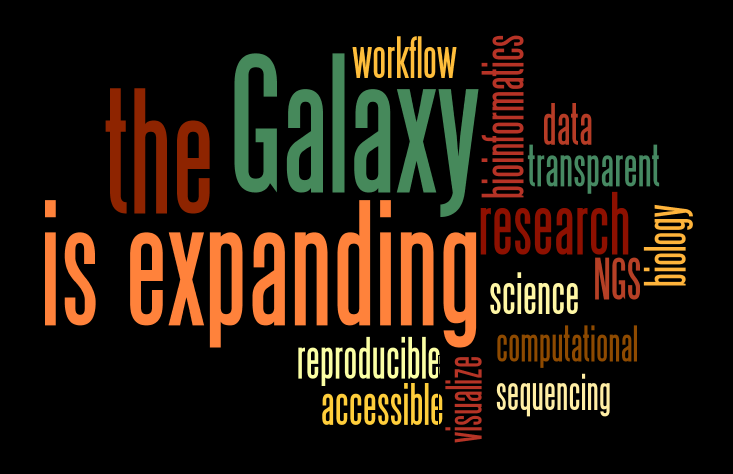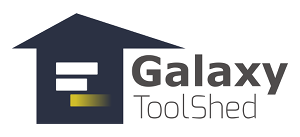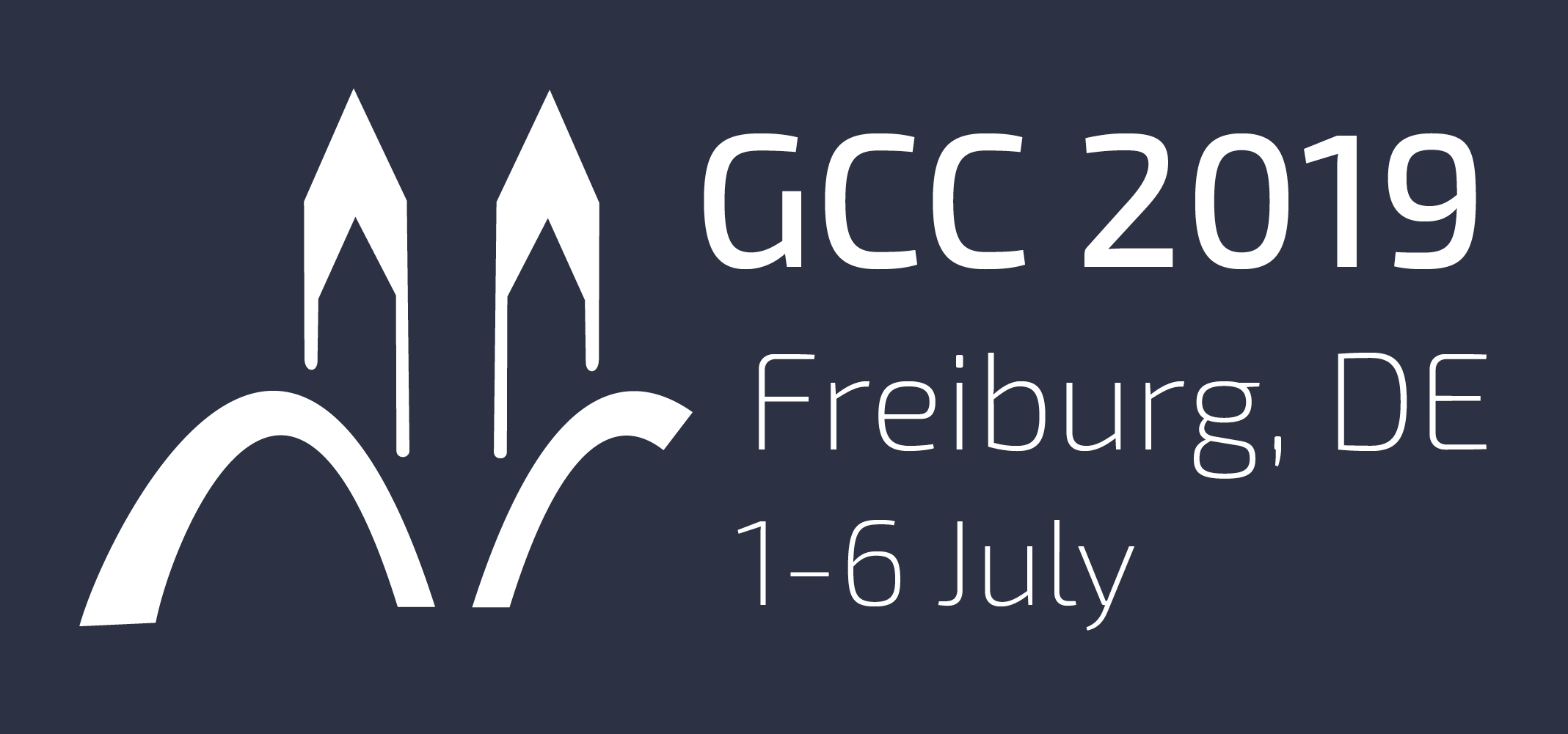July 2019 Galactic News
GCC2019 is here! (And other new stuff too)
The July 2019 Galactic News is here!
- GCC2019 is here!
- Plus 17 other upcoming events in the next 90 days
- 153 new publications, great resources lead to great insight.
- Galaxy Platform News for Galaxy Europe and Galaxy Australia
- At least 6 Open positions in five countries on two continents.
- Updates to training materials and documentation.
- New tools and new releases.
- And some other news too.
If you have anything to include to next month's newsletter, then please send it to outreach@galaxyproject.org.
GCC2019 is here!
The 2019 Galaxy Community Conference starts on Monday, 1 July. And we are all very excited, dang it!
- If you haven't registered yet, then you still can. We still have space in the training sessions on Monday, as well as in the conference itself on Tuesday through Thursday.
- We still have poster and demo space (although not much). Submit an abstract right now.
- There are more talks, posters, demos, BoFs and training at GCC2019 then at any GCC before it.
See you in Freiburg!
Upcoming events
Deadlines this month:
- NGS & Cancer : Analyses épigénomiques, limite d’inscription : lundi 8 juillet 2019, midi
- Formation metabarcoding 2019, limite des inscriptions: 15 juillet
- Gateway Focus Week (formerly Science Gateways Bootcamp), applications due July 19.
- Single cell RNA-seq analysis: From questions to clusters, applications due 29 July.
Publications
153 new publications referencing, using, extending, and implementing Galaxy were added to the Galaxy Publication Library in the last month.
Highlighted Publications
There were 7 Galactic and Stellar publications added, and all of them are open access:
- Computational Linguistics Applications for Multimedia Services, Kyeongmin Rim, Kelley Lynch, James Pustejovsky. Proceedings of the 3rd Joint SIGHUM Workshop on Computational Linguistics for Cultural Heritage, Social Sciences, Humanities and Literature.
- BioUML: an integrated environment for systems biology and collaborative analysis of biomedical data, Fedor Kolpakov, Ilya Akberdin, Timur Kashapov, llya Kiselev, Semyon Kolmykov, Yury Kondrakhin, Elena Kutumova, Nikita Mandrik, Sergey Pintus, Anna Ryabova, Ruslan Sharipov, Ivan Yevshin, Alexander Kel. Nucleic Acids Research, gkz440, doi: 10.1093/nar/gkz440
- ANASTASIA: An Automated Metagenomic Analysis Pipeline for Novel Enzyme Discovery Exploiting Next Generation Sequencing Data, Theodoros Koutsandreas, Efthymios Ladoukakis, Eleftherios Pilalis, Dimitra Zarafeta, Fragiskos N. Kolisis, Georgios Skretas and Aristotelis A. Chatziioannou. Frontiers in Genetics, 24 May 2019 doi: 10.3389/fgene.2019.00469
- Cloud Bursting Galaxy: Federated Identity and Access Management, Vahid Jalili, Enis Afgan, James Taylor, Jeremy Goecks. Bioinformatics, 14 June 2019, btz472, doi: 10.1093/bioinformatics/btz472
- The Tritryps Comparative Repeatome: Insights on Repetitive Element Evolution in Trypanosomatid Pathogens, Sebastián Pita, Florencia Díaz-Viraqué, Gregorio Iraola, Carlos Robello. Genome Biology and Evolution, Volume 11, Issue 2, February 2019, Pages 546–551, doi: 10.1093/gbe/evz017
- Fostering bioinformatics education through skill development of professors: Big Genomic Data Skills Training for Professors, Yingqian Ada Zhan, Charles Gregory Wray, Sandeep Namburi, Spencer T. Glantz, Reinhard Laubenbacher, Jeffrey H. Chuang. PLOS Computational Biology, June 13, 2019, doi: 10.1371/journal.pcbi.1007026
- APERO: a genome-wide approach for identifying bacterial small RNAs from RNA-Seq data, Simon Leonard, Sam Meyer, Stephan Lacour, William Nasser, Florence Hommais, Sylvie Reverchon. Nucleic Acids Research, gkz485, 31 May 2019, doi: 10.1093/nar/gkz485
Publication Topics
| # | Tag | # | Tag | # | Tag | # | Tag | |||
|---|---|---|---|---|---|---|---|---|---|---|
| 102 | +Methods | 45 | +UsePublic | 21 | +UseMain | 20 | +Workbench | |||
| 13 | +RefPublic | 9 | +UseLocal | 6 | +Reproducibility | 5 | +IsGalaxy | |||
| 5 | +Tools | 3 | +Cloud | 3 | +Other | 2 | +Project | |||
| 1 | +Education | 1 | +Shared | 1 | +Unknown | 1 | +UseCloud |
Galaxy Platforms News
The Galaxy Platform Directory lists resources for easily running your analysis on Galaxy, including publicly available servers, cloud services, and containers and VMs that run Galaxy.
UseGalaxy.eu News
- Tool Recommendation: What do I do next?, usegalaxy.eu has implemented tool recommendation, finally answering the question "what to do next."
- UseGalaxy.eu Tool Updates for 2019-06-21, usegalaxy.eu is getting ready for GCC 2019
- TIaaS Queue Status, using UseGalaxy.eu’s Training infrastructure as a Service (TIaaS).
- Native support for Elixir-AAI in Galaxy v.19.05: the European Galaxy Server hosted by Elixir Germany is now ready to accept logins from users using their Elixir AAI identity for authentication.
GalaxyAustralia News
OpenMinTeD: Open Mining Infrastructure for Text & Data

OpenMinTeD is dedicated to offering advanced high-quality TDM-related services to researchers, TDM experts, SMEs and industry – anyone interested in making sense and extracting hidden knowledge from the huge bulks of scientific and scholarly content. Galaxy is used to build and execute workflows on the platform. Sign in to the platform, choose Add in the menu and then Applications. Then choose Build an application with existing components to access the Galaxy-based workflow editor. To run a workflow use the Process menu item.
Guidelines and other support material are available. Anyone can create a login. Galaxy can be used to build workflows, but interactive use of Galaxy is restricted - i.e. you cannot interact with the history. The execution of workflows happens via the the platform.
OpenMinTeD will be presented at GCC2019.
Galaxy Platforms in Publications
Platforms that were referenced at least twice in the past month's publications:
| # | Tag | # | Tag | # | Tag | # | Tag | |||
|---|---|---|---|---|---|---|---|---|---|---|
| 19 | >Huttenhower | 5 | >RepeatExplorer | 3 | >CPT | 3 | >Galaxy-P | |||
| 3 | >GVL-Unspecified | 3 | >Workflow4Metabolomics | 2 | >ARGs-OAP | 2 | [>Genomic Hyperbrowser](https://www.zotero.org/groups/1732893/galaxy/tags/>Genomic Hyperbrowser) |
Who's Hiring

The dark energy of irreproducible research is threatening the science universe! Please help the Galaxy push it back!
- Bioinformaticien h/f - INNOLEA, Mondonville, France. "Le développement d'outils pour l'analyse de données génétiques, génomiques et la mise en œuvre dans une plateforme Galaxy"
- Postdoctoral Fellows, Blankenberg Lab, Cleveland Clinic, Cleveland, Ohio, United States.
-
ELIXIR Belgium has three Galaxy-related openings in Ghent:
- ELIXIR Open Science Community Manager, VIB-UGent Center for Plant Systems Biology
- ELIXIR Software developer data management tools, VIB-UGent Center for Plant Systems Biology
- ELIXIR Scientific Cloud Coordinator, VIB-UGent Center for Plant Systems Biology
-
The The European Galaxy Team has open positions, Freiburg, Germany
- Software engineer, system analysts/administrators, data analyst, and a community and/or research manager
Have a Galaxy-related opening? Send it to outreach@galaxyproject.org and we'll put it in the Galaxy News feed and include it in next month's update.
Doc, Hub, and Training Updates
Updates from the Galaxy Training Materials:
- Workflows: Using Workflow Parameters, a new tutorial by Marius van den Beek and Helena Rasche.
- Antibiotic resistance detection, a new tutorial (including a tour) from new contributor Willem de Koning and veteran Saskia Hiltemann
- Slides for the Galaxy Mapping tutorial were thoroughly updated by Saskia Hiltemann. Lots of new information, an overview of real life mappers, and an interactive game!
- Biomarker candidate identification, a new Galaxy tutorial from Florence Combes, David Christiany, Valentin Loux, and Yves Vandenbrouck - All of them first time contributors! Florence will be presenting ProteoRE, the server used in this tutorial, in a talk and a demo at GCC2019.
- Exome sequencing data analysis for diagnosing a genetic disease tutorial completely revamped by Wolfgang Maier (who will be teaching the Variant Calling I - from sequenced reads to variant lists and Variant Calling II - causative variant discovery sessions at GCC2019)
ToolShed Contributions
 ](http://toolshed.g2.bx.psu.edu/)
](http://toolshed.g2.bx.psu.edu/)Tool Shed contributions in June 2019.
Releases
New additions (and editions) in the Galaxy Ecosystem.
Galaxy v 19.05
The May 2019 Galaxy release comes with additional user-facing release notes, and the full release notes as well. Big improvements in this release include a rewrite of the login and registration system, and improvements in workflow expressivity.
Pulsar 0.13.0
Pulsar is a Python server application that allows a Galaxy server to run jobs on remote systems (including Windows) without requiring a shared mounted file systems. Unlike traditional Galaxy job runners - input files, scripts, and config files may be transferred to the remote system, the job is executed, and the results are transferred back to the Galaxy server - eliminating the need for a shared file system.
Other News
- Praveen Kumar, who presented A “Divide and conquer” approach to address peptide-spectrum matching challenges of large sequence databases in next-generation proteomic applications at ASMS 2019, was awarded an ASMS student travel award to attend.
- Supporting Open Science for Climate Researchers in Nordic Countries, Bérénice Batut interviews Anne Fouilloux. This work will be presented at GCC2019
- CellOrganizer for Galaxy v2.8 released




